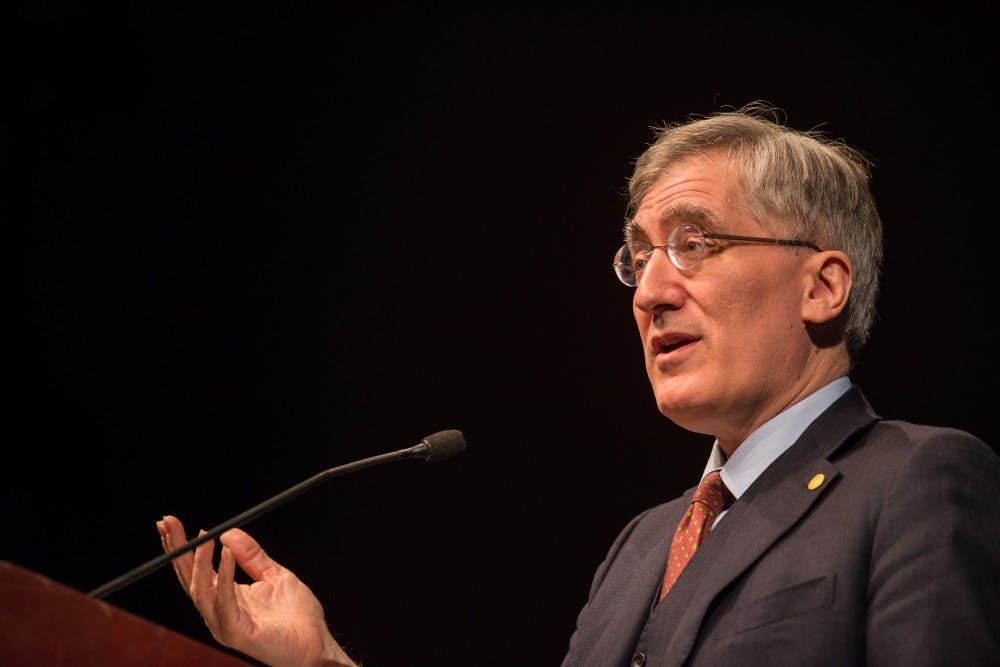On August 29, a group of professors from Princeton, Harvard, and Yale released a statement encouraging students to “think for yourself.”
The statement was posted on the website of the University’s James Madison Program in American Ideals and Institutions, an institute headed by one of the letter’s co-authors, Robert George, the McCormick Professor of Jurisprudence. The program is "dedicated to exploring enduring questions of American constitutional law and Western political thought,” according to its website.
“‘Think for yourself’ used to be a platitude,” reads the statement, “But in today’s climate of political correctness, it’s radical advice.”
Quoting English philosopher John Stuart Mill, the authors warn students about “the tyranny of public opinion,” which discourages minority thinkers from challenging prevailing moral and political views.
“Since no one wants to be, or be thought of as, a bigot or a crank, the easy, lazy way to proceed is simply by falling into line with campus orthodoxies,” the letter says to students, telling them to “Think for [themselves].”
The authors encourage students to seek truth in their intellectual pursuits. “Open-mindedness, critical thinking, and debate are essential” to this end, they write, and “are our best antidotes to bigotry.”
Lastly, they explain that a bigot is “a person who is obstinately or intolerantly devoted to his or her own opinions and prejudices.”
“The only people who need fear open-minded inquiry and robust debate are the actual bigots,” they add, “including those on campuses or in the broader society who seek to protect the hegemony of their opinions by claiming that to question those opinions is itself bigotry.”

On Aug. 30, George appeared as a guest on Tucker Carlson Tonight, a nightly news series on Fox News.
On air, he noted that liberals and conservatives alike share the conviction that scholars should be committed to truth.
He also warned against name-calling, which he described as “out of bounds.”
“Epithets like ‘bigotry’ are used all too often to shut down debate,” he said.

George added that he wanted to release the statement before classes started in order to reach students. He contacted colleagues who “share this conviction” about truth-seeking to sign the letter.
George, a prominent conservative scholar, has defended freedom of thought and expression several times. In March 2017, he co-authored a statement with University professor emeritus Cornel West, currently a professor at Harvard, encouraging academic communities “to engage with anyone who is prepared to do business in the currency of truth-seeking discourse by offering reasons, marshaling evidence, and making arguments.”
Signatories to West and George’s statement included professors, students, parents, and members of the clergy.
University professors whose names appear on the letter include George, Maria Garlock, Joshua Katz, Thomas Kelly, John Londregan, and Michael Reynolds. Other signatories include Yale professors Paul Boom, Nicholas Christakis, Carlos Eire, and Noël Valis; and Harvard professors Mary Ann Glendon, Jon Levenson, Jacqueline Rivers, Tyler VanderWeele, and Adrian Vermeule.
Debra Parker, program manager for the James Madison program, deferred comment to Politics Professor John Londregan, one of the statement’s signatories.
Londregan explained that the commitment to free speech does not change in a world of "alternative facts."
“When [Counselor to the President] Kellyanne Conway coined the term ‘alternative facts,’ our exercise of free speech turned her into a laughing stock,” he said. “In a world of censorship, Conway's feelings, which were doubtlessly hurt by the derision she prompted, would have led to silencing of her critics, and Conway would have shifted from buffoon to Orwellian tyrant.”
Londregan also noted the perception that fringe skeptic groups place pressure on freedom of speech.
“Unhinged groups are those that are most marginalized when the inconsistencies of their reasoning are exposed through open discussion,” he said. “Of course, sometimes there are groups on the fringes who have an argument worth listening to, and with free speech, we are able to sort through both sets of arguments, discard the craziness, and benefit from the useful – if unpopular – insights of others.”
Londregan presented a full account of his decision to appear as one of the statement’s signatories in an letter to the editor for the 'Prince.'








